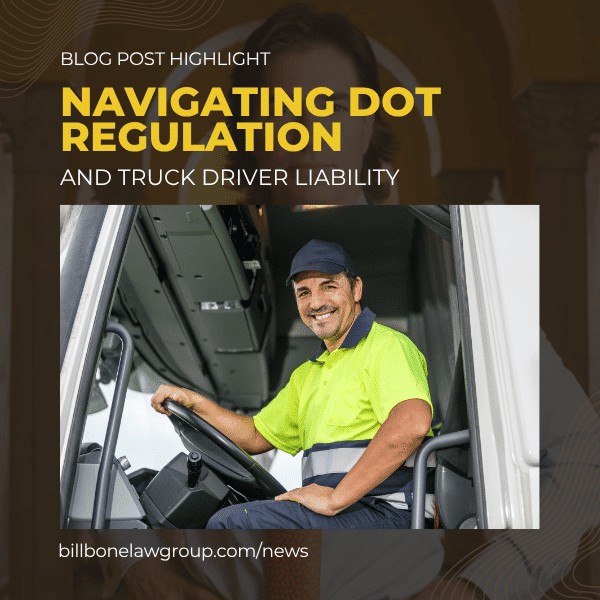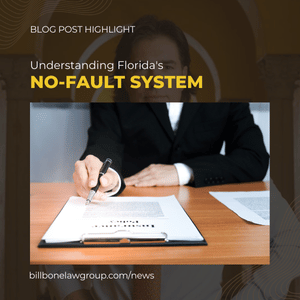Who’s at Fault in Semi-Truck Collisions?
Determining Liability in West Palm Beach Truck Accidents
Who’s at fault in semi-truck collisions? Every year, hundreds of drivers are injured along I-95 and Florida’s Turnpike in West Palm Beach and across Palm Beach County due to collisions involving massive semi-trucks, tractor-trailers, and commercial vehicles.
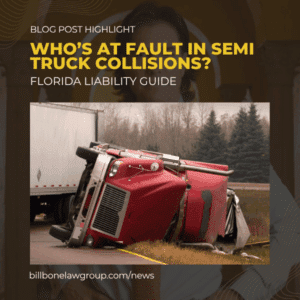 When an 80,000-pound truck collides with a passenger car, the resulting damage and injuries are almost always catastrophic. Knowing who is at fault – and who is legally liable – is the critical first step in seeking justice and financial recovery.
When an 80,000-pound truck collides with a passenger car, the resulting damage and injuries are almost always catastrophic. Knowing who is at fault – and who is legally liable – is the critical first step in seeking justice and financial recovery.
At Bill Bone Law Group, we’ve represented victims of truck accidents and other serious injuries for over 25 years. We understand the complex web of state and federal regulations that govern the commercial trucking industry, and we know how to successfully overcome industry defense tactics to prove negligence.
You May Need This Article If:
- You or a loved one was injured in a commercial truck accident in West Palm Beach or Palm Beach County.
- You’re unsure who’s liable or whether you can sue the truck driver or the trucking company.
- A family member was killed or severely hurt in a commercial vehicle crash.
- You’re overwhelmed by insurance paperwork, or your claims have been denied.
If you or someone you love has been injured in a car accident involving a large truck, you may be entitled to compensation under Florida law. The experienced attorneys at Bill Bone Law Group are ready to fight for your rights – call us today for a free consultation.
What Is a Semi-Truck Accident Case?
A semi-truck collision case is a type of personal injury lawsuit based on the legal concept of negligence. In simple terms, negligence is the failure to exercise the care that a reasonably prudent person would exercise in similar circumstances, resulting in harm to another.
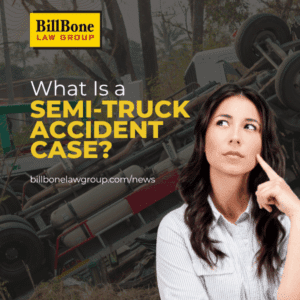
- Duty: The at-fault party (e.g., the truck driver, trucking company) owed the victim a legal duty of care (e.g., the duty to drive safely or maintain a safe vehicle).
- Breach: The at-fault party breached that duty (e.g., by speeding, driving while fatigued, or failing to maintain brakes).
- Causation: This breach caused the accident and resulting injuries.
- Damages: The victim suffered measurable damages (e.g., medical bills, lost wages, or pain and suffering) as a result of the accident.
Unlike standard car accidents, truck collision cases are complicated by the potential for multiple liable parties and multiple layers of federal and state regulations that apply to commercial trucks.
These cases frequently involve claims of vicarious liability, where the trucking company is held responsible for the negligent actions of its employee – the driver – under the principle of respondeat superior.
Comparative Fault
A major factor in determining fault is Florida Statutes § 768.81, which sets forth the state’s modified comparative negligence system. This law means that if you, the victim, are found to be partially at fault for the crash, your compensation will be reduced by your percentage of assigned fault.
Importantly, if you are found to be more than 50% at fault, you are legally barred from recovering any damages at all. This makes proving a higher percentage of fault for the trucking party absolutely essential.
How Semi-Truck Collisions Happen in Palm Beach County?
Palm Beach County serves as a vital artery for commercial traffic, with major interstate highways like I-95, Florida’s Turnpike, and US-1 running directly through major cities like West Palm Beach and Boca Raton. The heavy volume of both local and long-haul commercial trucks creates unique risks on these busy roadways.
Common factors contributing to semi-truck collisions in our area include:
 Driver Fatigue
Driver Fatigue
Truck drivers are often pressured to meet demanding deadlines, leading them to violate strict federal Hours-of-Service (“HOS”) regulations. Tired drivers on long stretches of I-95 can be dangerously delayed in their reaction time.
Negligent Maintenance
Due to the sheer weight and constant use of commercial vehicles, maintenance failures – such as faulty brakes, steering problems, or tire blowouts – are common. A trucking company’s failure to maintain its fleet is a direct form of negligence.
Distracted Driving
Texting, eating, or operating electronic devices by a truck driver is magnified considerably by the size of their vehicle, making the resulting crash far more severe.
Improper Cargo Loading
If a truck’s cargo is improperly secured, overloaded, or unbalanced, it can cause the truck to become unstable, leading to jackknife accidents or rollovers, particularly on curves or during emergency stops.
While the Florida Department of Highway Safety and Motor Vehicles (“FLHSMV”) tracks crash data statewide, it’s widely acknowledged that Florida, due to its major shipping hubs and busy interstates like I-95, contributes a significant number of serious commercial truck accidents to national totals.
Understanding the Complexities of Truck Accident Liability
Establishing truck accident liability involves a detailed analysis of every factor that contributed to the crash. When a truck accident happened, investigators and personal injury lawyers must gather evidence such as maintenance logs, witness statements, and electronic data from the truck’s onboard computer.
Studies show that brake problems account for nearly 30% of truck accidents, making poor maintenance a frequent cause of mechanical failure. If driver negligence or poor maintenance played a role, both the semi truck driver and the trucking company may be responsible.
Sometimes, multiple parties share fault—including the truck manufacturer if defective components caused the accident, or if violations of federal motor carrier safety regulations contributed to the crash.
Since the blood alcohol concentration (BAC) limit for commercial drivers is lower than that for passenger vehicle drivers, even minimal impairment can be strong evidence of negligence.
Federal laws also regulate rest periods and maintenance schedules, and violations of these rules can strengthen a victim’s truck accident claim.
An experienced truck accident attorney understands how to trace accountability through these overlapping layers of responsibility and ensure all evidence is preserved for trial.
Can I File a Lawsuit in Florida?
Your ability to file a lawsuit and recover compensation depends on your injuries, who was at fault, and the timing of your claim.
 Who Can Be Held Liable?
Who Can Be Held Liable?
Fault in a semi-truck accident can extend beyond the driver to include several parties:
- The Truck Driver: If their negligence (e.g., speeding, distraction, intoxication) caused the crash.
- The Trucking Company: Often held liable for the driver’s actions (vicarious liability) or for its own direct negligence (e.g., negligent hiring, failure to train, or pressuring drivers to violate HOS regulations).
- The Cargo Loader: If the crash was caused by an improperly secured or dangerously overloaded trailer.
- The Maintenance or Repair Company: If a mechanical failure caused the accident due to faulty repair work.
Deadlines: Florida’s Statute of Limitations
The most critical deadline is the statute of limitations. Under Florida law, there is a 2-year limit from the date of the accident to file a personal injury lawsuit for negligence. F.S. § 95.11(5)(a). If a family member was killed, the deadline to file a wrongful death lawsuit is also generally 2 years from the date of death. F.S. § 95.11(5)(e).
It’s important to understand that this clock starts on the day of the decedent’s death, not the accident date. Missing either of these deadlines means you forfeit your right to seek compensation in court entirely.
What to Do After a Truck Accident
The moments following a truck collision in Palm Beach County are crucial for your health and your potential legal claim. The trucking company’s legal team and insurance adjusters are already mobilizing; you should, too.
- Seek Immediate Medical Attention: Your health is paramount. Even if you feel fine, some severe injuries, like a traumatic brain injury or whiplash, may have delayed symptoms.
- Call the Police: A formal police report is a vital piece of evidence that can document the scene and factors contributing to the crash.
- Preserve Evidence: If you are physically able, use your phone to take photographs or video of:
- The truck’s license plate, DOT number, and company name.
- The accident scene, including skid marks, road conditions, and traffic signs.
- The damage to your vehicle and any visible injuries you have sustained.
- Do Not Speak to Insurers: The trucking company’s insurance adjuster may call you within hours of the crash. Do not give a recorded statement or accept an early settlement offer. Anything you say can be used to shift the blame to you or undervalue your claim.
- Contact an Attorney Immediately: The single most important step you can take is to retain experienced legal counsel. Your attorney can immediately issue a spoliation letter to the trucking company, legally compelling them to preserve crucial evidence like the truck’s black box data, maintenance logs, and driver HOS records, which they might otherwise legally destroy or overwrite within weeks.
Recovering Compensation After a Truck Accident
Victims of truck accident cases often face devastating physical, emotional, and financial consequences. Injuries from crashes involving large commercial trucks and passenger vehicles tend to be severe due to the weight difference between the vehicles.
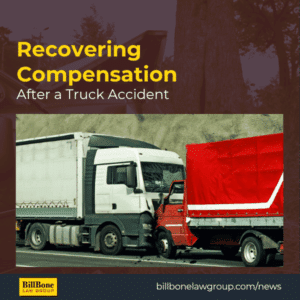
When pursuing a trucking accident claim, car drivers often benefit from hiring an accident attorney familiar with complex traffic laws and insurance negotiations. In some situations, defective truck components create liability for the truck manufacturer, while federal motor carrier safety violations or driver’s negligence can increase the likelihood of punitive damages.
Distracted driving, such as using a phone or GPS, and poor weather conditions like rain or fog can further complicate fault determinations.
Working with an experienced truck accident attorney allows victims to focus on recovery while their lawyer builds a case through evidence, expert testimony, and fair negotiation with insurers.
Speak With a Lawyer Today
Bill Bone Law Group has helped thousands of Florida injury victims seek justice and financial recovery. The complexities of commercial trucking laws, the high stakes of catastrophic injuries, and the aggressive tactics of corporate insurers require seasoned legal expertise.
We are ready to investigate your crash, identify all liable parties, and fight relentlessly for the full compensation you deserve.
Contact us today for a free consultation and case review, and let’s review who’s at fault in semi truck collisions.
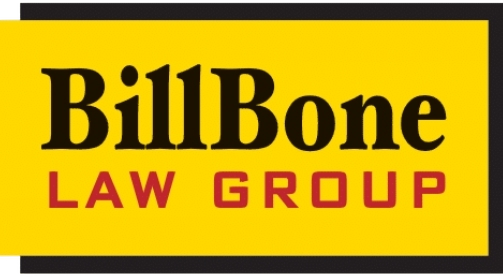
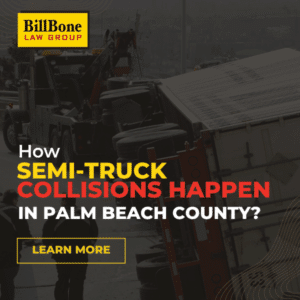 Driver Fatigue
Driver Fatigue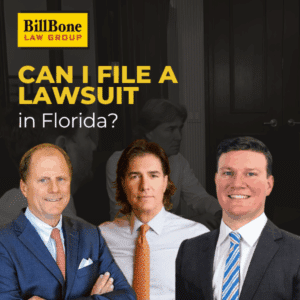 Who Can Be Held Liable?
Who Can Be Held Liable?